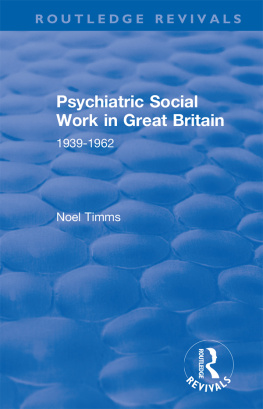Routledge Revivals
Recording in Social Work
Originally published in 1972 Recording in Social Work looks at how recording has always been claimed as one of the necessary activities of social workers, whatever form of social work they undertake. The book deals systematically with recording, and the theory and practice recording takes, as well as the research projects and small-scale studies which discuss critically certain aspects of the method. The book offers a review of the history of recording, including a critical discussion of the three early texts on the subject. It surveys the literature on purposes of recording and concludes with an analysis of the main issues surrounding recording. The book assesses the present position of theory and practice in social work recording and suggests both ways in which the subject can be developed and the wider context.
Recording in Social Work
by Noel Timms
First published in 1972
by Routledge & Kegan Paul Ltd
This edition first published in 2018 by Routledge
2 Park Square, Milton Park, Abingdon, Oxon, OX14 4RN
and by Routledge
711 Third Avenue, New York, NY 10017
Routledge is an imprint of the Taylor & Francis Group, an informa business
1972 Noel Timms
All rights reserved. No part of this book may be reprinted or reproduced or utilised in any form or by any electronic, mechanical, or other means, now known or hereafter invented, including photocopying and recording, or in any information storage or retrieval system, without permission in writing from the publishers.
Publishers Note
The publisher has gone to great lengths to ensure the quality of this reprint but points out that some imperfections in the original copies may be apparent.
Disclaimer
The publisher has made every effort to trace copyright holders and welcomes correspondence from those they have been unable to contact.
A Library of Congress record exists under LCCN: 72194409
ISBN 13: 978-1-138-36448-6 (hbk)
ISBN 13: 978-0-429-43133-3 (ebk)
Recording in Social Work
Noel Timms
Professor of Applied Social Studies, University of Bradford
First published 1972
by Routledge & Kegan Paul Ltd,
Broadway House, 68-74 Carter Lane,
London EC4V 5EL and
9 Park Street,
Boston, Mass. 02108, U.S.A.
Printed in Great Britain by
Northumberland Press Ltd,
Gateshead
Noel Timms 1972
No part of this book may be reproduced in
any form without permission from the
publisher, except for the quotation of brief
passages in criticism
ISBN 0 7100 7288 0 (c)
0 7100 7289 9 (p)
The Library of Social Work is designed to meet the needs of students following courses of training for social work. In recent years the number and kinds of training have increased in an unprecedented way. The Library will consist of short texts designed to introduce the student to the main features of each topic of enquiry, to the significant theoretical contributions so far made to its understanding and to some of the outstanding problems. Each volume will suggest ways in which the student might continue his work by further reading.
This book is divided into three main parts. makes some historical observations on social work recording, illustrating the broad phases through which the subject has passedin this, as in other aspects of social work history, we have as yet to be content with rather crude generalizations. This chapter ends with a brief comparative analysis of the three texts so far available on social work recording. As the subject of recording leads into so many other aspects of social work, so the treatment of the subject may serve as a model for the study of other aspects. Comparative analysis of social work texts is long overdue. The second chapter reviews the main objectives usually cited in discussions of recordingservice, teaching and research. Existing work on the nature of these objectives is reviewed, and a possibly fruitful direction for future work is indicated. Finally, in a discussion of some critical questions the author draws our attention to recording behaviour, the results of keeping a record and the difficulties in making one. The Appendix, which presents three different modes of recording the same interview, makes a contribution to the study and also suggests an exercise that students might usefully perform on their own work. Since this study largely takes the form of a literature review, the guide to further reading usually in this Library is, literally, taken as read.
The record holds an important place in any of the main methods of social workcasework, groupwork, residential work and community work. Yet, as the author states, we have no contemporary text on the subject. The present work is not intended as a detailed guide to the practical problems of recording, but as an attempt to assess our present ideas and knowledge about recording so that tasks for the future can be more precisely described. Such a critical treatment is important not simply because it is hard to conceive of any evaluated social work without records, but also because within what can be described as the problems of recording we can see in miniature some of the central problems of social work.
And what in observation is loose and vague is in information deceptive and treacherous
Francis Bacon
I would like to express my sincere thanks to Tricia Sharp who worked efficiently and cheerfully as my research assistant during the writing of this book. I am also indebted to John Hart for the case records in the Appendix.
The absence of a contemporary British text on social work recording seems neither noted nor mourned. The topic appears to lack both appeal and urgency, and this is somewhat strange. The supposed or possible achievements of social work are often debated, but for the last hundred years or so most social work interventions have had one actual and undeniable resultsome kind of record of the business transacted between agency and client. The history of recording in social work is as long as the history of modern social work. Moreover, the students record and recording have played an important part in social work education since formal training began. The emphasis in evaluation has undoubtedly changed from a concern with good habits in what a student once described as methods of personal service and case-paper work to a close criticism of the recording of the process of an interview: recent British books on student supervision consist largely or almost entirely of such detailed recordings (Heywood, 1964; Kent, 1969). Despite this important change records of some kind have featured in the training of students for a good many years.
Recording is evidently of importance in social work but contemporary textbooks devote little or no space to the systematic discussion of the purpose, methods and use of such recording. Hollis (1964) gives 2 out of 266 pages, Wilson and Ryland (1949) allocate 10 out of 619 pages on social group work whilst Perlman (1957) is silent on the subject. It is rare to find an author such as Davison (1965) devoting a chapter to the topic. Yet these and other writers clearly accept the social work record as a fact of existence, and Hollis in particular uses the systematic study of actual records to establish and justify an elaborate typology of casework treatment. Recorded material (suitably disguised) is, of course, a marked feature of most social work texts, but little or no attention is given to the problems of recording, let alone to problems raised in any claim to have a record of such complicated phenomena as the interaction of two or more human beings.








